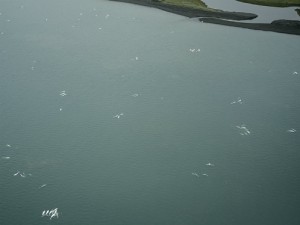It’s not a trick question, though at first the proposition can seem off-putting, if not unrelated. In the Chukchi Sea and the adjacent Beaufort Sea, off Arctic Alaska, bowhead, beluga, and grey whales are commonly spotted, while fin whales, minkes, humpbacks, killer whales, and narwhals are all venturing into these seas ever more often as the Arctic and its waters continue to warm rapidly. Sounds harmless, right ?
?
The problem, however, is that the major oil company Royal Dutch Shell wants to drill in the Chukchi Sea this summer and that could, in the long term, spell doom for one of the last great, relatively untouched oceanic environments on the planet. Let me explain why Shell’s drilling ambitions are so dangerous. Just think of the way the blowout of one drilling platform, BP’s Deepwater Horizon, devastated the Gulf of Mexico. Now, imagine the same thing happening without any clean-up help in sight.
You might have heard about “the sixth extinction,” the way at this moment species are blinking off at a historically unprecedented rate. The Arctic seas of Alaska, however, still are sanctuaries not only for tens of thousands of whales, but also hundreds of thousands of walruses and seals, millions of birds, thousands of polar bears, and innumerable fish from more than one hundred species, not to mention all the uncharismatic sub-sea life that eludes our eyes but makes up the food web — phytoplankton, sea urchins, sand dollars, and sea cucumbers, to name only a few. Think of the Arctic Ocean as among the last remaining marine ecological paradises on the planet.
Sometimes the question is not, ‘When will we learn?’ but ‘Will we learn?’ From the looks of current thinking on public education, the trends are not encouraging.
